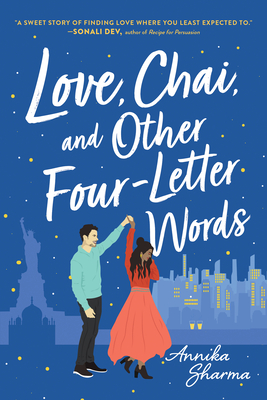
Love, Chai, and Other Four-Letter Words
September 25, 2021
Kiran Mathur has always followed the rules her parents set down for her. Falling in love, especially after watching how her sister was thrown out of her family for following her heart, is not in the books. Nash Hawthorne has gotten used to abandonment. When the two become neighbors, they both end up questioning their beliefs.
I loved the CMC - especially having Kiran as an Indian from India, Akash and Sonam as Indian American, and Payal as British-Indian was also cool to see how they contrasted with each other. This steady friendship that Kiran has as a family away from her family is one of the highlights of the book. Each member of the CMC is a fun, fleshed out character.
As a rom-com, this book checks off so many of the romance tropes and I enjoyed reading all the cute scenes between the two of them. I also loved how this book was a bit of a love letter to New York City, and I loved reading about all these things they were doing even though I'm not familiar with NYC.

There are many pretty heavy topics that get discussed - parental abandonment, drug abuse, racism, casteism, emotional abuse/ emotional blackmail, acid attack, xenophobia, death of a parent. Both of our main characters have a lot of baggage when it comes to their family and upbringing, and their baggage understandably clashes in this story.
I'm not Indian, so I can't comment on how good the representation was in this story. I just think that if there were such a line that Kiran was not willing to cross when it came to her family, why did she not draw the line with Nash way before their relationship had started to bloom when it did? Nash was even angry that she had not told him earlier when she finally did confess. They clearly were having moments before their first kiss, so she clearly knew that this was where their relationship was going. I also didn't really like the almost-white-savior vibes that I got from some of the things Nash said or did, which was at the very least, incredibly ignorant. I appreciated that much of it was called out by Kiran, but I found that what Nash did in the climax to be very uncomfortable, and it was built out to be romantic, but I expected (given the way that the parents had verbally abused Kiran and emotionally blackmailed her with her decision to date Nash), that it would go very poorly overall. It left me feeling very torn when I was trying to reconcile the conclusion of the book with all the nasty confrontations that happened between Kiran and her parents.

Finally, there were a few small things that made me uncomfortable. I was a bit taken aback at the mentions of the pandemic, and how it was already post-pandemic life. It felt weird to read for me, especially since cases are still incredibly bad in the US, not to mention other parts of the world. Secondly, there were many mentions of Harry Potter throughout the book, which, given the fact that this book also mentioned the pandemic, I know this book was written relatively recently, makes me a bit sad that Harry Potter was chosen to be mentioned. I was prepared to forgive the first mention, but then both characters mentioned it multiple times, and it was never brought forth as some sort of thing they had in common or anything of that sort - it easily could've been written as another book series or fandom and given all the harm that JK Rowling has done to the trans community, I was a bit shocked to see it mentioned so many times.
Thank you to Sourcebooks Casablanca and NetGalley for the ARC.

More about Love, Chai, and Other Four-Letter Words here:


Title: Love, Chai, and Other Four-Letter Words
Author: Annika Sharma
Kiran needs to fall in line. Instead, she falls in love.
Kiran was the good daughter. When her sister disobeyed her family’s plan and brought them shame, she was there to pick up the pieces. She vowed she wouldn’t make the same mistakes. She’d be twice the daughter her parents needed, to make up for the one they lost.
Nash never had a family. The parents who were supposed to raise him were completely absent. Now as a psychologist, he sees the same pattern happening to the kids he works with. So he turns away from love and family. After all, abandonment is in his genes, isn’t it?
If she follows the rules, Kiran will marry an Indian man. If he follows his fears, Nash will wind up alone. But what if they follow their hearts?
